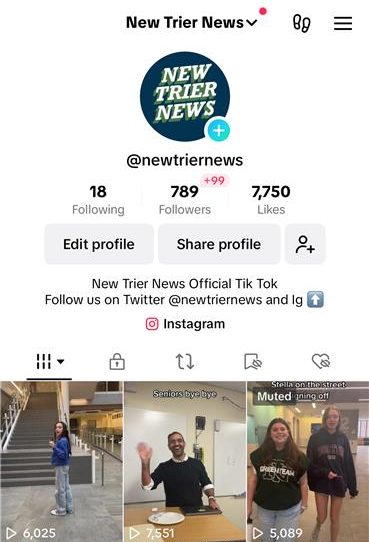A potential nationwide TikTok ban raises concern amongst students who feel it would hinder their ability to receive and share information about academics, entertainment, and trends. Some say, however, that the ban would not address the negative side of TikTok and other social media platforms.
That comes as the U.S. House of Representatives passed legislation on March 13 that, if enacted into law, would force ByteDance, the parent company of TikTok, to sell the popular platform in six months or become blocked in the U.S. The U.S. fears that the Chinese government could use TikTok, used by about 170 million Americans, to collect American data, push propaganda, or interfere in elections, but has yet to provide evidence to back up those assertions.
According to a Gallup survey, TikTok is one of the most popular social media platforms, with teenagers spending about 1.5 hours on the app every day.
“TikTok is such a popular [app] that, even if you don’t post on your own account, you’re going to be caught at least once a day scrolling through your TikTok account and watching videos,” West Chicago Community High School senior Alexa Morales, features editor for the Wildcat Chronicle, said.
Morales said that TikTok has helped the Wildcat Chronicle grow in recognition.
“TikTok [is] just such an easy way to interact with my peers and show them what we do at the Chronicle,” Morales said.
The Wildcat Chronicle recently posted a TikTok where a few reporters performed a pirouette, which their editor-in-chief, a dance team member, taught them how to do.
Morales said without TikTok, where each video for the publication receives about a couple hundred views, the Wildcat Chronicle would need to spend more energy creating content for other social media platforms, which takes time away from them being students.
New Trier High School junior Allie Ross said TikTok has helped her learn mathematical concepts.
“Students in classes that a bunch of other students are taking around the world can learn from another student things that a teacher might not think of saying,” Ross said. “It’s really easy to learn from, whether you’re trying to learn just short-term, really quick tips or just a whole unit.”
Under a TikTok ban, Ross said she would need to ask questions about her homework during or after school, as she would not have the content accessible at night to support her when she completes her homework.
As numerous young people engage with TikTok, the Village of Glencoe joined TikTok to reach that demographic. As of publication, activity on their TikTok has been paused but may come back in the future.
“We’ve since stalled using it [TikTok] as we’ve found it wasn’t really our residents that were engaging with us. We also always posted the same video on Instagram as a reel and saw way better engagement, and from our followers specifically,” Samantha Hanzel, communications manager for the Village of Glencoe, said via email.
New Trier senior Lilly Lipford said that on TikTok, users are exposed to many more people than on other social media platforms, such as Instagram, where the people you see are typically friends and celebrities.
Lipford said that TikTok has helped prepare her for college.
“It helps you see [the] experiences of other kids who just had their first year [in college],” Lipford said. “You get these random students and they have so much different information and ideas for how you can be successful in college.”
Downers Grove South High School senior Owen Chaidez, an editor-in-chief for the Blueprint, said that TikTok has more useful features than other social media platforms.
“TikTok gives you a lot of tools at your disposal to make fun little videos and some really creative things you can do with it,” Chaidez said. “I think restricting that is going to harm us.”
The Blueprint uses TikTok to inform students about when newspaper distribution happens. They also promote huge school events or post the occasional fun video where students express their thoughts on having no school or on seniors leaving for summer before other students.
Lipford said that people should not use TikTok to consume news.
“If you’re gonna be learning about important topics, you shouldn’t just be getting it off of TikTok. I think that makes it so easy to spread misinformation and that can be dangerous,” Lipford said.
TikTok has also pushed some reporters to seek new perspectives and work on interviewing.
“It promotes our reporters to talk to new people and it is good for them [to] get to know faces around the school for their interviewing usage,” Niles North High School junior Penelope Roewe, managing editor and opinions editor for North Star News, said.
For those TikToks, Roewe said that reporters interview students about sporting events, such as the Super Bowl or March Madness.
Lipford said that the addictiveness of TikTok has impacted her beyond when she uses social media.
“My attention span has gone down so much where it can be difficult to watch a TV show,” Lipford said.
Lipford, a camp counselor, is concerned that TikTok and other social media platforms will negatively impact younger generations, as they gain more access to information—some that they should not be exposed to.
“I don’t know if banning TikTok is the solution to that, but I think we need to address that issue more and that should be a higher priority than China stealing our information,” Lipford said.
Amidst the debate over whether to ban TikTok, Chaidez understands the concern over a foreign government to have access to people’s data. Yet, he feels that banning TikTok would set a dangerous precedent concerning the First Amendment.
“You start with TikTok but where does it end? When does it become restricting freedom of speech?” Chaidez said.








































